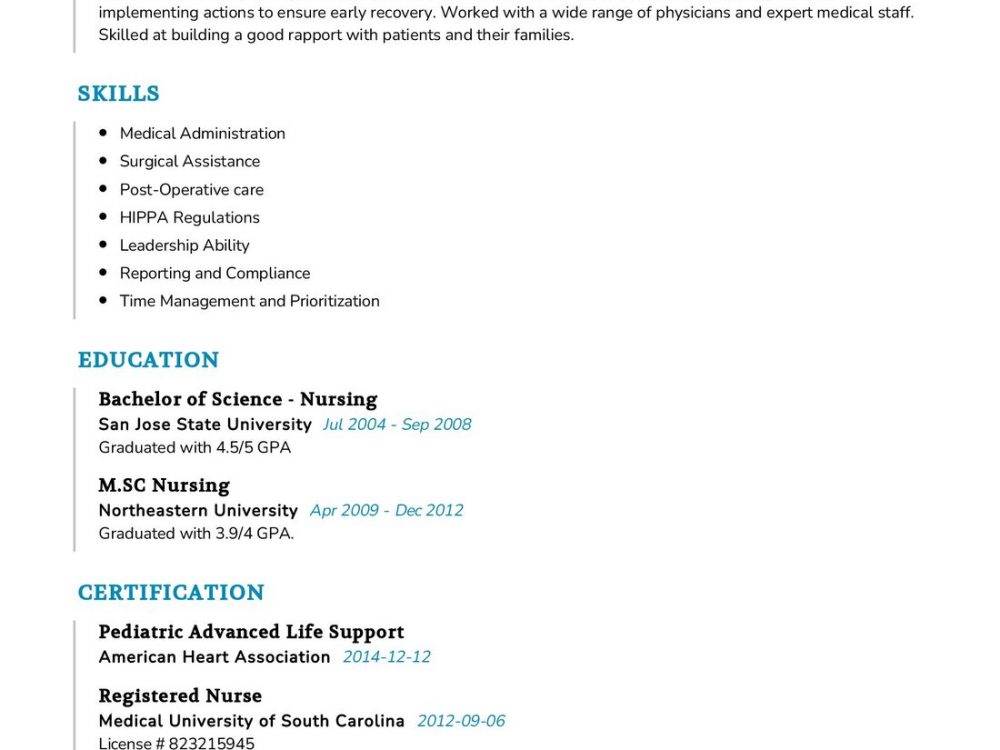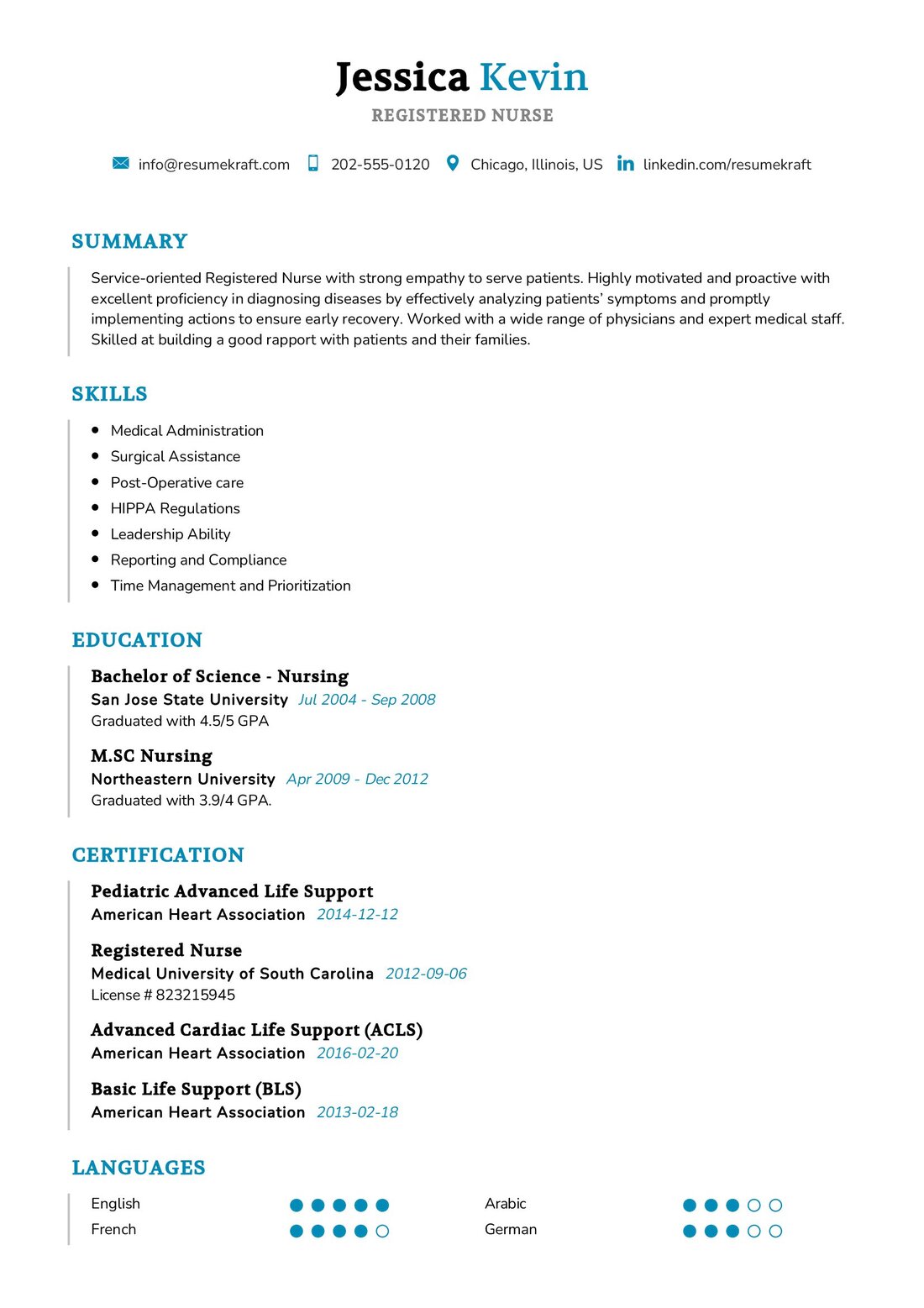Exploring the Role of a Registered Nurse
The field of healthcare is ever-evolving, and at the heart of patient care is the Registered Nurse (RN). As a pivotal member of the healthcare team, a Registered Nurse plays a crucial role in ensuring the well-being of patients and providing essential support to physicians. In this comprehensive guide, we’ll delve into the multifaceted responsibilities of a Registered Nurse, the necessary qualifications, and key insights to help you craft an impressive Registered Nurse resume.
What are the Job Requirements for a Registered Nurse?
Becoming a Registered Nurse requires a combination of education, clinical expertise, and a compassionate approach to patient care. Let’s explore the essential requirements for this rewarding profession:
- A Bachelor of Science in Nursing (BSN) degree or an Associate Degree in Nursing (ADN) from an accredited institution.
- Successful completion of the National Council Licensure Examination for Registered Nurses (NCLEX-RN) to obtain the required nursing license.
- Clinical expertise in areas such as medical-surgical, pediatric, or critical care nursing, gained through hands-on experience in healthcare settings.
- Strong communication and interpersonal skills, essential for effective collaboration with patients, their families, and the healthcare team.
- Attention to detail and critical thinking skills, crucial for making timely and accurate decisions in fast-paced healthcare environments.
- Adaptability and resilience to navigate challenges in the dynamic field of healthcare.
Continued professional development, including participation in workshops and obtaining certifications in specialized areas, further enhances a Registered Nurse’s profile.
Responsibilities of a Registered Nurse
The role of a Registered Nurse is diverse, encompassing a wide range of responsibilities aimed at promoting patient health and well-being. Here are the core duties that define the day-to-day activities of an RN:
- Conducting patient assessments, including vital signs, medical history, and overall health status.
- Developing and implementing nursing care plans tailored to individual patient needs.
- Administering medications and treatments prescribed by physicians, ensuring patient safety and adherence to protocols.
- Collaborating with the healthcare team, including physicians, therapists, and other nurses, to ensure comprehensive patient care.
- Providing emotional support and education to patients and their families, fostering a positive healthcare experience.
- Monitoring and evaluating patient progress, adjusting care plans as necessary to achieve optimal outcomes.
- Advocating for patients and ensuring their rights and preferences are respected within the healthcare system.
These responsibilities demand a combination of medical knowledge, empathy, and effective communication, making the role of a Registered Nurse both challenging and rewarding.
Registered Nurse Resume Writing Tips
Crafting a compelling resume is crucial for showcasing your skills and experiences as a Registered Nurse. Here are some tips to help you create a standout resume:
- Highlight your clinical expertise and any specialized areas of nursing in which you excel.
- Showcase instances where you’ve demonstrated effective communication and collaboration within a healthcare team.
- Quantify your achievements, such as improvements in patient outcomes or successful implementation of care plans.
- List relevant certifications, including any additional training or workshops you’ve completed.
- Customize your resume for each application, emphasizing skills and experiences that align with the specific job requirements.
Your resume is a reflection of your dedication to patient care and your contributions to the healthcare field.
Registered Nurse Resume Summary Examples
Your resume summary is a snapshot of your nursing career, providing potential employers with a quick overview of your qualifications. Here are some examples to inspire your resume summary:
- “Compassionate Registered Nurse with a BSN and five years of experience in pediatric nursing, dedicated to providing high-quality care and building strong relationships with young patients and their families.”
- “Experienced RN with a background in critical care nursing, known for quick decision-making and effective collaboration in high-pressure situations. Proven track record of improving patient outcomes.”
- “Detail-oriented and empathetic Registered Nurse with a focus on medical-surgical nursing. Adept at developing and implementing comprehensive care plans for diverse patient populations.”
Your resume summary sets the tone for your entire application, capturing the essence of your nursing career in a few impactful sentences.
Create a Strong Experience Section for Your Registered Nurse Resume
The experience section of your resume is where you tell the story of your nursing journey. Use this section to highlight specific achievements and contributions to patient care. Here are some examples to guide you:
- “Led a team of nurses in a busy emergency department, reducing patient wait times by 15% through improved triage processes.”
- “Implemented a new medication administration protocol on the pediatric ward, resulting in a 30% decrease in medication errors.”
- “Collaborated with the interdisciplinary team to develop and implement a pain management program, improving patient comfort and satisfaction scores.”
Your experience section is an opportunity to showcase the impact you’ve had on patient care and the success of healthcare initiatives.
Education Section for Your Registered Nurse Resume
Your educational background is a key component of your nursing resume. Here’s how you can present your academic achievements:
- Bachelor of Science in Nursing (BSN), XYZ University, equipped with in-depth theoretical and practical knowledge, 2015.
- Associate Degree in Nursing (ADN), ABC Community College, providing a solid foundation for clinical practice, 2012.
- Advanced Cardiovascular Life Support (ACLS) Certification, showcasing expertise in emergency cardiovascular care, 2018.
Each educational milestone represents a step in your journey to becoming a skilled and knowledgeable Registered Nurse.
Skills Every Registered Nurse Should Include
Your skill set as a Registered Nurse is a powerful tool in delivering exceptional patient care. Here are the essential skills to highlight in your resume:
Soft Skills:
- Empathy and compassion, crucial for building trust and rapport with patients.
- Effective communication, both with patients and members of the healthcare team.
- Critical thinking and problem-solving, essential for making sound clinical decisions.
- Attention to detail, ensuring accuracy in patient assessments and care plans.
- Adaptability and resilience, navigating the ever-changing landscape of healthcare.
Hard Skills:
- Proficiency in administering medications and treatments, adhering to established protocols.
- Technical competence in using healthcare information systems for patient documentation.
- Knowledge of medical terminology and procedures, facilitating effective communication within the healthcare team.
- Wound care and basic nursing procedures, demonstrating hands-on clinical expertise.
- Collaboration and teamwork, fostering a positive and cohesive healthcare environment.
Each skill you possess is a valuable asset in providing high-quality patient care and contributing to the success of the healthcare team.
Common Mistakes to Avoid in Your Registered Nurse Resume
Avoiding common pitfalls is essential in crafting a compelling Registered Nurse resume. Here are some mistakes to steer clear of:
- Using generic language that fails to highlight your unique skills and experiences.
- Listing job duties without showcasing the positive impact you’ve had on patient care or healthcare initiatives.
- Overlooking the importance of a well-crafted cover letter, a valuable opportunity to convey your passion for nursing.
- Overloading your resume with medical jargon, potentially alienating non-medical professionals who may review your application.
- Neglecting to proofread your resume, as errors can undermine your professionalism and attention to detail.
Avoiding these mistakes will help ensure that your resume effectively communicates your value as a Registered Nurse.
Key Takeaways for Your Registered Nurse Resume
As you navigate the process of creating your Registered Nurse resume, keep these key points in mind:
- Highlight your clinical expertise and specialized areas of nursing in your resume to stand out to potential employers.
- Showcase your effective communication and collaboration skills, emphasizing their importance in delivering quality patient care.
- Quantify your achievements to provide tangible evidence of your impact on patient outcomes and healthcare initiatives.
- Include relevant certifications and training to demonstrate your commitment to ongoing professional development.
Finally, feel free to utilize resources like AI Resume Builder, Resume Design, Resume Samples, Resume Examples, Resume Skills, Resume Help, Resume Synonyms, and Job Responsibilities to create a standout application and prepare for the Registered Nurse job interview.


